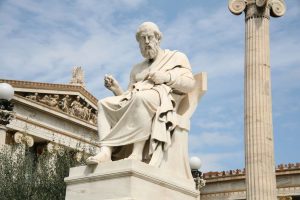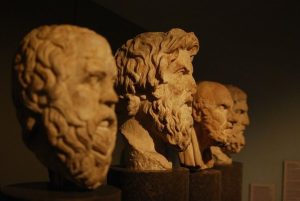Why is Plato Called the Father of Politics?
Why is Plato called the Father of Politics?
In the western tradition, Plato, the father of political theory and philosophy, is regarded as a significant philosopher. The dialogues based on the ideology were written by the Athens-born philosopher. His ideas are the focus of debates concerning rights, law, justice, power, and other aspects of government.
Introduction to Plato
Plato, born circa 427 BCE in Athens, Greece, was a student of the renowned philosopher Socrates and the teacher of Aristotle. He founded the Academy in Athens, one of the earliest institutions of higher learning in the Western world. Plato’s writings cover various subjects, including ethics, metaphysics, epistemology, and politics, but his political philosophy remains one of his most enduring legacies.
Plato’s Life and Background

Early Life and Education
Plato was born into an aristocratic family and received a rigorous education in philosophy, mathematics, and athletics. He was deeply influenced by the teachings of Socrates, whose method of inquiry and relentless pursuit of truth left a lasting impression on him.
Influence of Socrates
Socrates, Plato’s mentor, emphasized the importance of questioning assumptions and seeking knowledge through dialogue and critical thinking. His trial and subsequent death deeply impacted Plato, leading him to question the nature of justice, democracy, and governance. Read more articles: Who Was the Youngest UK Prime Minister?
Plato’s Political Philosophy
Plato’s political philosophy is encapsulated in his seminal work, “The Republic,” where he outlines his vision of an ideal society governed by philosopher-kings.
Ideal State
In “The Republic,” Plato constructs an ideal state governed by philosopher-kings, individuals who possess both intellectual acumen and moral integrity. He believed that only those who had transcended the material world through education and philosophical contemplation were fit to rule.
The Allegory of the Cave
Central to Plato’s political philosophy is the allegory of the cave, which serves as a metaphor for the journey of enlightenment and the role of the philosopher in guiding society towards truth and justice. Discover more: Demystifying Politics
The Republic: Plato’s Magnum Opus
Overview
“The Republic” is Plato’s most famous work, a dialogue between Socrates and several other characters discussing the nature of justice, the ideal state, and the philosopher’s role in society.
The Philosopher-King
Plato argues that the ideal ruler is the philosopher-king, a wise and benevolent leader who governs with virtue and wisdom rather than self-interest or ambition.
The Tripartite Soul
In “The Republic,” Plato introduces the concept of the tripartite soul, consisting of reason, spirit, and appetite. He contends that a harmonious society requires each individual to cultivate these aspects of the soul in balance.
Plato’s Influence on Political Thought

Plato’s ideas have had a profound impact on Western political philosophy, shaping the way we think about governance, justice, and the nature of the state.
Legacy in Western Philosophy
Plato’s dialogues continue to be studied and debated by scholars and philosophers worldwide, reflecting his enduring influence on Western thought.
Impact on Modern Politics
Many of Plato’s ideas, such as the pursuit of justice, the importance of education, and the role of the state in promoting the common good, continue to resonate in contemporary political discourse.
Criticisms of Plato’s Political Ideas
While Plato’s political philosophy has been highly influential, it has also faced criticism for its perceived impracticality and totalitarian implications.
Lack of Practicality
Critics argue that Plato’s ideal state is utopian and unrealistic, overlooking the complexities of human nature and social dynamics.
Totalitarian Implications
Some scholars have criticized Plato’s emphasis on the philosopher-king as potentially authoritarian, raising concerns about the concentration of power and the suppression of individual liberty.
Conclusion
Plato’s enduring legacy as the father of politics stems from his profound insights into the nature of governance, justice, and the ideal society. While his ideas have been both celebrated and critiqued, their impact on Western political thought cannot be overstated.
FAQs
- Was Plato the first political philosopher? Plato is often regarded as one of the earliest and most influential political philosophers, but he was preceded by thinkers such as Confucius and Aristotle.
- Did Plato believe in democracy? Plato was critical of democracy, viewing it as a flawed form of government that could easily descend into tyranny.
- What is the significance of “The Republic” in Plato’s political philosophy? “The Republic” serves as Plato’s most comprehensive exploration of political theory, outlining his vision of an ideal state and the philosopher’s role within it.
- How did Plato’s political ideas influence later thinkers? Plato’s ideas had a profound impact on subsequent political philosophers, including thinkers such as Machiavelli, Rousseau, and Marx.
- What are some common criticisms of Plato’s political philosophy? Critics often point to the impracticality of Plato’s ideal state and raise concerns about its potential for authoritarianism.
